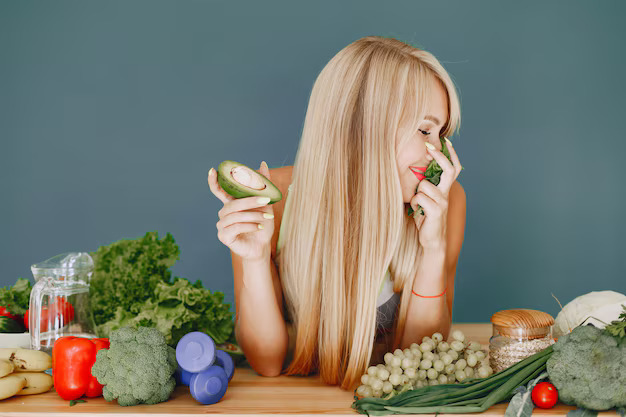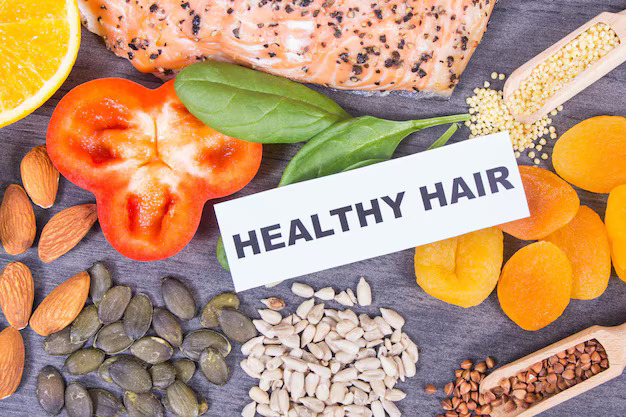10 Biotin-Rich Foods To Boost Hair Growth
When it comes to achieving lustrous, thick, and healthy hair, there’s no magic potion—but the nutrients you consume play a crucial role. One nutrient that consistently garners attention for its remarkable ability to support hair growth is biotin, also known as vitamin B7 or vitamin H. Biotin is a water-soluble B-vitamin that is vital for numerous bodily functions, especially for maintaining the health of skin, nails, and most notably—hair.
If you’ve been struggling with hair thinning, brittle strands, or slow hair growth, biotin may be the missing link in your nutrition. Instead of turning to synthetic supplements right away, consider starting with your diet. Many foods are naturally rich in biotin and can provide a steady and safe source of this vital nutrient.
In this blog post, we’ll dive deep into 10 biotin-rich foods that can help boost your hair growth naturally, how biotin works in the body, how much biotin you need daily, and what signs of deficiency to watch out for.

What Is Biotin and Why Does It Matter for Hair Growth?
Biotin is part of the B-complex family of vitamins. It acts as a coenzyme in the body, helping to metabolize fatty acids, amino acids, and glucose.
These metabolic processes are vital for energy production and are directly connected to the health of your skin, nails, and especially your hair follicles.
Biotin’s Role in Hair Growth
Biotin contributes to:
- Keratin production, the key structural protein of hair
- Strengthening the infrastructure of hair follicles
- Reducing hair breakage and thinning
- Supporting faster hair regrowth after shedding
While biotin deficiency is rare, a lack of this nutrient can lead to noticeable hair loss, brittle nails, and dry, scaly skin. Fortunately, you can help replenish biotin levels with the right dietary choices.
How Much Biotin Do You Need?
According to the National Institutes of Health (NIH), the Adequate Intake (AI) for biotin is:
- 30 micrograms (mcg) per day for adults
- 35 mcg/day for breastfeeding women
Most people can get enough biotin through a balanced diet, but those with conditions like malabsorption, alcohol dependency, pregnancy, or certain genetic disorders may need more biotin to maintain hair health.
10 Biotin-Rich Foods To Boost Hair Growth
Let’s now explore ten powerful, biotin-packed foods you can incorporate into your diet for healthier, stronger, and faster-growing hair.
1. Egg Yolks
Biotin Content: About 10 mcg per cooked egg (33% of Daily Value)
Egg yolks are one of the richest sources of naturally occurring biotin. The biotin is mostly found in the yolk, not the egg white. Cooking the eggs is essential, as raw egg whites contain avidin, a protein that can bind to biotin and prevent its absorption.
Aside from biotin, eggs are packed with protein, vitamin D, and other B-vitamins—making them a hair growth superfood.
How to Use: Enjoy boiled, scrambled, poached, or sunny-side up. Eggs are versatile and can be included in any meal of the day.
2. Liver (Beef or Chicken)
Biotin Content: Beef liver – about 30 mcg per 3 oz cooked (100% of Daily Value)
Organ meats, especially liver, are the biotin kings. Just a small serving of cooked beef or chicken liver can fulfill or even exceed your daily biotin needs. Liver also provides iron, vitamin A, and zinc, which are all essential for healthy hair growth.
How to Use: Pan-fried with onions, incorporated into pâté, or slow-cooked with herbs.
3. Nuts and Seeds (Especially Almonds, Sunflower Seeds, and Walnuts)
Biotin Content: Almonds – 1.5 mcg per ¼ cup
Sunflower seeds – 2.6 mcg per ¼ cup
Nuts and seeds are not only excellent for snacking but are also a great source of healthy fats, vitamin E, protein, and—of course—biotin. Sunflower seeds and almonds top the list, but walnuts and peanuts also contribute smaller amounts of biotin.
How to Use: Add them to oatmeal, yogurt, salads, or eat raw as a snack.
4. Salmon
Biotin Content: About 5 mcg per 3 oz cooked salmon
Salmon is a biotin-rich, protein-packed food and also one of the best sources of omega-3 fatty acids, which are proven to reduce hair loss, boost hair density, and combat scalp inflammation. It also contains vitamin D and selenium, both important for hair health.
How to Use: Grilled, baked, or pan-seared with herbs, lemon, and olive oil.
5. Sweet Potatoes
Biotin Content: 2.4 mcg per ½ cup cooked
Sweet potatoes are not only a healthy carb but also a surprising source of biotin. They’re rich in beta-carotene, which converts into vitamin A, essential for scalp health and sebum production.
How to Use: Bake, mash, or roast them. Sweet potato fries are also a delicious option
6. Legumes (Lentils, Chickpeas, Peas)
Biotin Content: Lentils – about 1.8 mcg per ½ cup cooked
Legumes are a plant-based powerhouse of protein, fiber, iron, and biotin. Lentils, black beans, and chickpeas all help to nourish the hair follicles and promote growth by supporting the overall health of the scalp.
How to Use: Add to stews, soups, or salads. You can also make homemade hummus using chickpeas.
7. Whole Grains (Oats, Barley, Brown Rice)
Biotin Content: Oats – around 0.2 to 0.6 mcg per ½ cup cooked
Whole grains are not only good for your digestion but also contribute to hair health due to their biotin, B-complex vitamins, and zinc content. They offer sustained energy and help keep your scalp nourished.
How to Use: Start your day with a bowl of oatmeal or switch to brown rice and quinoa in meals.
8. Bananas
Biotin Content: About 0.2–0.4 mcg per medium banana
Bananas may not be the highest source of biotin, but they make up for it with their content of vitamin B6, fiber, and potassium. They’re also very easy to digest and can be paired with other biotin-rich foods like nuts or yogurt for a synergistic effect.
How to Use: Eat them as-is, slice them into cereal, or blend into smoothies.
9. Dairy Products (Milk, Cheese, Yogurt)
Biotin Content: Milk – about 0.3 mcg per cup
Cheddar cheese – 0.4 mcg per oz
Dairy products provide modest levels of biotin along with protein, calcium, and other B-vitamins that support hair strength and structure.
How to Use: Go for Greek yogurt parfaits, a glass of milk, or cheese in sandwiches.
10. Avocados
Biotin Content: About 2–6 mcg per medium avocado
This creamy, nutrient-dense fruit is not just trendy; it’s a biotin-rich superfood for your hair. Avocados are also full of healthy fats, vitamin E, and antioxidants, all of which contribute to a healthy scalp and strong hair strands.
How to Use: Add to toast, salads, smoothies, or mash it into guacamole.
Signs of Biotin Deficiency
Biotin deficiency is rare but possible, especially among certain groups. Here are some signs to look out for:
- Hair thinning or hair loss
- Brittle nails
- Dry or scaly skin
- Conjunctivitis (eye inflammation)
- Fatigue or mood changes
- Tingling in the limbs
Those at risk include people with chronic alcohol use, pregnant women, individuals with Crohn’s disease, or those on long-term antibiotics or anti-seizure medications.

Tips to Maximize Biotin Absorption
- Cook your eggs: Raw egg whites can hinder biotin absorption due to the avidin content.
- Balance your diet: Don’t rely on just one food. Eat a variety of biotin sources to get the best results.
- Pair with protein: Biotin works synergistically with amino acids for optimal keratin production.
- Stay hydrated: Water aids in nutrient absorption and supports a healthy scalp environment.
Should You Take a Biotin Supplement?
For most people, food sources provide sufficient biotin. However, if you have a deficiency or are experiencing hair loss that doesn’t improve with dietary changes, a biotin supplement might help. Always consult with a healthcare provider before starting any new supplement.
Final Thoughts
Hair health is not just about what you put on your scalp—it starts from within. By incorporating these 10 biotin-rich foods into your diet, you can take a natural and effective step toward healthier, fuller hair.
From nutrient-dense liver to versatile avocados, nature has already provided the building blocks for vibrant, resilient hair growth.
Your journey to better hair doesn’t require a drastic change—just a few smart, biotin-rich additions to your meals can make a significant difference over time.
If you’re serious about supporting your hair from the inside out, make biotin-rich foods a part of your everyday plate and give your hair the nutrients it truly craves.
References
- https://ods.od.nih.gov/factsheets/Biotin-HealthProfessional/
- https://lpi.oregonstate.edu/mic/vitamins/biotin
- https://www.hsph.harvard.edu/nutritionsource/vitamins/biotin/
- https://www.healthline.com/nutrition/biotin-foods
- https://www.medicalnewstoday.com/articles/biotin-for-hair
- https://www.mayoclinic.org/drugs-supplements-biotin/art-20362267